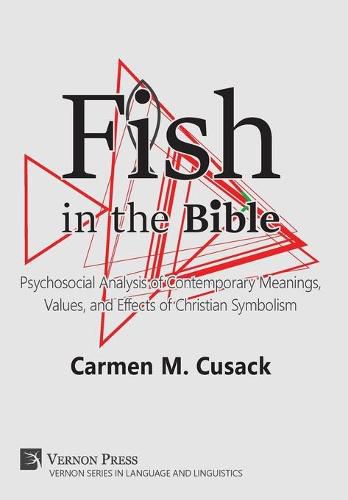Readings Newsletter
Become a Readings Member to make your shopping experience even easier.
Sign in or sign up for free!
You’re not far away from qualifying for FREE standard shipping within Australia
You’ve qualified for FREE standard shipping within Australia
The cart is loading…






This title is printed to order. This book may have been self-published. If so, we cannot guarantee the quality of the content. In the main most books will have gone through the editing process however some may not. We therefore suggest that you be aware of this before ordering this book. If in doubt check either the author or publisher’s details as we are unable to accept any returns unless they are faulty. Please contact us if you have any questions.
Fish in the Bible: Psychosocial Analysis of Contemporary Meanings, Values, and Effects of Christian Symbolism analyzes why and to what end tales and truths about fish presented in the Bible hold water in Christian societies today. Fish in the Bible argues that portraits of fish and fishermen presented in the Bible have been both embraced and rejected by contemporary cultures with primarily Christian constituents (e.g. American culture). This book does not make an ethical argument; rather, it explores manners in which Christians have selectively rejected or accepted depictions and symbols of fish and fishermen. It explores differences between Christian maxims presented in Bible verses and the beliefs and actions of societies operating under Christian moral majorities. Fish in the Bible also considers the evolution of symbolism and metaphors in Christian society using parables and tales found in the Bible.
Fish in the Bible works on several specialized topics to argue that, overall, depictions of fish and fishermen in the Bible significantly and subtly shape Christian cultures even when Christians ignore or dismiss the robust ways in which fish and fishermen are characterized and treated in the Bible. Fish serve as a metaphor for God’s power, judgment, sin, and fertility; they are used to instill boundaries and standards in practitioners; and sometimes fish are worshiped, demonized, and subjugated. There is no clear or singular message regarding fish or fishermen; and Christian societies are left to abide by a patchwork of representations to formulate their own opinions and judgments. Social and behavioral science, as well as cultural customs, commerce, and current events demonstrate Christians’ navigation and interpretations of what their understandings and treatment of fish and fishermen ought to be.
An Introduction and Conclusion summarize and synopsize implications raised by symbolism and literalism in certain contexts, stories, and verses demonstrating potentially pervasive significances of fish in Christian cultures throughout the world. The foundations of this research are law, social and behavioral science, policy and politics, history, cultural studies, religious studies, animal studies, animal welfare, criminal justice, sociology, anthropology, and current events.
$9.00 standard shipping within Australia
FREE standard shipping within Australia for orders over $100.00
Express & International shipping calculated at checkout
This title is printed to order. This book may have been self-published. If so, we cannot guarantee the quality of the content. In the main most books will have gone through the editing process however some may not. We therefore suggest that you be aware of this before ordering this book. If in doubt check either the author or publisher’s details as we are unable to accept any returns unless they are faulty. Please contact us if you have any questions.
Fish in the Bible: Psychosocial Analysis of Contemporary Meanings, Values, and Effects of Christian Symbolism analyzes why and to what end tales and truths about fish presented in the Bible hold water in Christian societies today. Fish in the Bible argues that portraits of fish and fishermen presented in the Bible have been both embraced and rejected by contemporary cultures with primarily Christian constituents (e.g. American culture). This book does not make an ethical argument; rather, it explores manners in which Christians have selectively rejected or accepted depictions and symbols of fish and fishermen. It explores differences between Christian maxims presented in Bible verses and the beliefs and actions of societies operating under Christian moral majorities. Fish in the Bible also considers the evolution of symbolism and metaphors in Christian society using parables and tales found in the Bible.
Fish in the Bible works on several specialized topics to argue that, overall, depictions of fish and fishermen in the Bible significantly and subtly shape Christian cultures even when Christians ignore or dismiss the robust ways in which fish and fishermen are characterized and treated in the Bible. Fish serve as a metaphor for God’s power, judgment, sin, and fertility; they are used to instill boundaries and standards in practitioners; and sometimes fish are worshiped, demonized, and subjugated. There is no clear or singular message regarding fish or fishermen; and Christian societies are left to abide by a patchwork of representations to formulate their own opinions and judgments. Social and behavioral science, as well as cultural customs, commerce, and current events demonstrate Christians’ navigation and interpretations of what their understandings and treatment of fish and fishermen ought to be.
An Introduction and Conclusion summarize and synopsize implications raised by symbolism and literalism in certain contexts, stories, and verses demonstrating potentially pervasive significances of fish in Christian cultures throughout the world. The foundations of this research are law, social and behavioral science, policy and politics, history, cultural studies, religious studies, animal studies, animal welfare, criminal justice, sociology, anthropology, and current events.